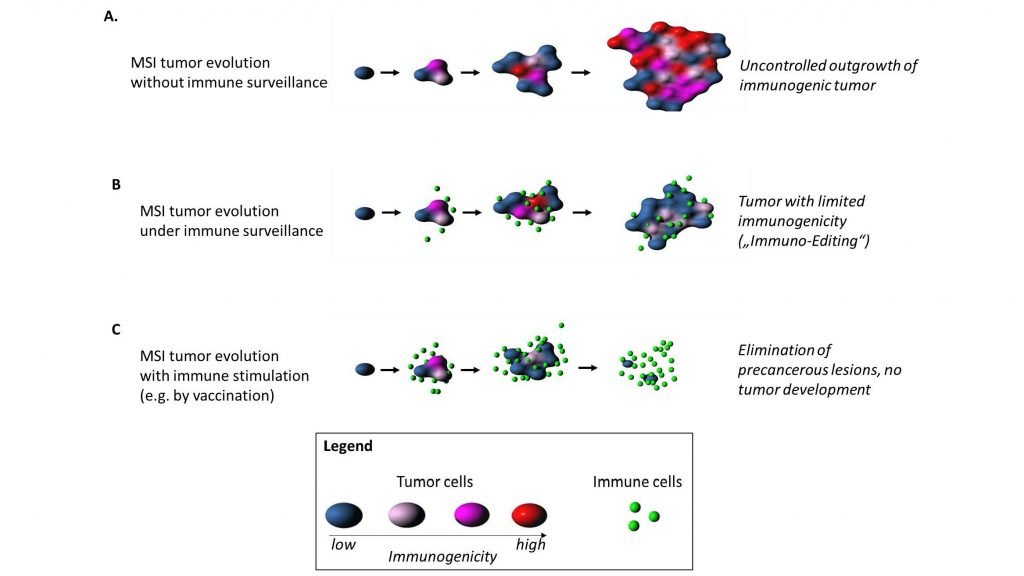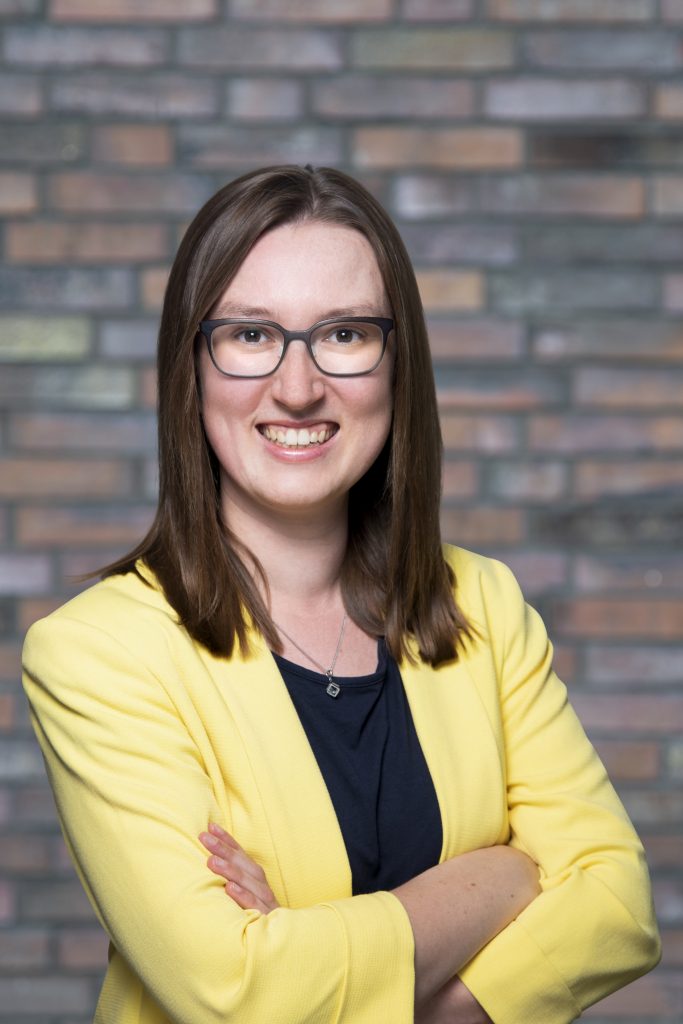The calculated tumor – how algorithms support the search for vaccines against cancer
Malignant tumors are caused by genetic mutations. In so-called microsatellite unstable (MSI) tumors, an important repair system of the cell has failed, which normally corrects small errors in the genetic material during cell division. Scientists from the Heidelberg Institute for Theoretical Studies (HITS), the German Cancer Research Center (DKFZ), the Heidelberg University Hospital and Heidelberg University have now developed a new algorithm to identify mutations in these tumors that are identical in numerous patients and also lead to altered protein structures.
Worldwide, around 500,000 MSI tumors are diagnosed every year. They are particularly prevalent in colorectal and endometrial tumors, often as part of a hereditary tumor syndrome (Lynch syndrome), of which 1 in every 300 people may be affected. That means they have a hereditary risk of over 50% of developing colon cancer or endometrium cancer in the course of their life. The resulting novel protein structures in these tumors, so-called neoantigens, are often recognized by the immune system and respond well to immune therapies. Until recently, though, researchers did not know whether these neoantigens occur randomly in microsatellite unstable cancers.
To investigate this, a research team in the Department of Applied Tumor Biology (ATB) at the University Hospital Heidelberg initiated a study to explore new ways of prevention and therapies. They used a novel algorithm recently developed at the University Hospital, Heidelberg University and HITS, which quantitatively evaluates the mutations in MSI tumor cells. „Our algorithm is able to distinguish between errors which can occur during the evaluation of the data and genuine mutations in tumors. With previous evaluation methods this has been difficult,“ says Saskia Haupt from the Engineering Mathematics and Computing Lab (EMCL) at Heidelberg University and visiting scientist at HITS.
The team could also show for the first time that the immune system monitors the tumor during its development and immediately eliminates cancer cells with highly immunogenic neoantigens. The immune system therefore forms the tumor during its development. In a further step the scientists were also able to predict which of these neoantigens might be able to activate the immune system.
„The quantitative evaluation of molecular and genetic data clearly shows the benefits of a close cooperation between different disciplines, such as medicine, tumor biology, mathematics and computer science“, summarizes Vincent Heuveline, head of the EMCL and group leader at HITS.
The study, which was published in „Nature Communications“, strongly supports the hypothesis that immunogenic cancer cell clones may be attacked and potentially eradicated by the host’s immune system and encourages the concept of cancer-preventive vaccines that may in the future help to reduce MSI tumor risk.
Publication in Nature Communications
Alexej Ballhausen, Moritz Jakob Przybilla, Michael Jendrusch, Saskia Haupt, Elisabeth Pfaffendorf, Markus Draxlbauer, Florian Seidler, Sonja Krausert, Aysel Ahadova, Martin Simon Kalteis, Daniel Heid, Damian Stichel, Johannes Gebert, Maria Bonsack, Sarah Schott, Hendrik Bläker, Toni Seppälä, Jukka-Pekka Mecklin, Sanne Ten Broeke, Maartje Nielsen, Vincent Heuveline, Julia Krzykalla, Axel Benner, Angelika Beate Riemer, Magnus von Knebel Doeberitz, Matthias Kloor: The shared neoantigen landscape of MSI cancers suggests immunoediting during tumor evolution.
Nature Communications 2020, DOI: 10.1038/s41467-020-18514-5. https://www.nature.com/articles/s41467-020-18514-5
Contributions
The study was a collaborative project of the Heidelberg University Hospital, the Heidelberg University, the DKFZ (German Cancer Research Center) and national and international cooperation partners. Project coordinator Matthias Kloor from the Department of Applied Tumor Biology (ATB, Head: Magnus von Knebel Doeberitz), Institute of Pathology, University Hospital Heidelberg, Collaboration Unit Applied Tumor Biology (DKFZ) and Molecular Medicine Partnership Unit (MMPU, EMBL Heidelberg), a physician scientist who has been working in the field of translational cancer research and MSI tumor immunology for more than a decade, has been responsible for the study design. In close collaboration, Alexej Ballhausen, Moritz Przybilla, and Michael Jendrusch, all from ATB, obtained molecular data and performed mutation data analysis. Together with Saskia Haupt and Vincent Heuveline from the Engineering Mathematics and Computing Lab (EMCL) at the Interdisciplinary Center for Scientific Computing (IWR) of Heidelberg University and from the Heidelberg Institute for Theoretical Studies HITS, bioinformatics-based algorithms were developed and data analysis was performed. Maria Bonsack and Angelika Riemer from the Department for Immunotherapy and Immunoprevention (DKFZ) and Molecular Vaccine Design, German Center for Infection Research (DZIF), partner site Heidelberg, contributed to immunological in silico predictions. Julia Krzykalla and Axel Benner from the Division of Biostatistics (DKFZ) performed biostatistics analysis. Overall, 30 scientists – physicians, molecular biologists, tumor biologists, computer scientists, and mathematicians – from several universities and countries participated in this study. Apart from the institutions mentioned, additional institutions of the Universities of Heidelberg, Leipzig, Helsinki and Jyväskylä (Finland), and Leiden (The Netherlands) provided great support to the project.
The source code of the developed ReFrame algorithm can be accessed on GitHub (https://github.com/atb-data/neoantigen-landscape-msi).

Tumor-immune interaction in MSI tumors with the effect of a possible vaccine: without immune surveillance (A), under immune surveillance (B) and with immune stimulation (C). © Matthias Kloor, Angewandte Tumorbiologie, Universitätsklinikum Heidelberg.
About HITS
HITS, the Heidelberg Institute for Theoretical Studies, was established in 2010 by physicist and SAP co-founder Klaus Tschira (1940-2015) and the Klaus Tschira Foundation as a private, non-profit research institute. HITS conducts basic research in the natural, mathematical, and computer sciences. Major research directions include complex simulations across scales, making sense of data, and enabling science via computational research. Application areas range from molecular biology to astrophysics. An essential characteristic of the Institute is interdisciplinarity, implemented in numerous cross-group and cross-disciplinary projects. The base funding of HITS is provided by the Klaus Tschira Foundation.
